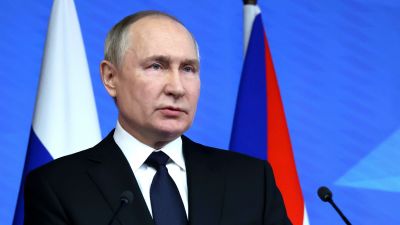Vladimir Putin warns increasing US arms to Ukraine will 'aggravate' the war further

The Kremlin warned on Wednesday that increasing the supply of US arms to Ukraine would aggravate the devastating 10-month war ignited by Russia's invasion, as Russia's defence minister called for expanding Moscow's military by at least 500,000 people.
Speaking during a meeting with his top military brass, Russian President Vladimir Putin said Moscow would take lessons learned in the conflict to “develop our armed forces and strengthen the capability of our troops.”
He said special emphasis would go to developing nuclear forces, which he described as “the main guarantee of Russia’s sovereignty.”
The rhetoric from Moscow came as Ukrainian President Volodymyr Zelenskyy prepared to meet with President Joe Biden in Washington, where US officials have announced a huge new military aid package for Kyiv.
Putin also said the Russian military's new Sarmat intercontinental ballistic missile is set to enter service shortly.
The Sarmat is intended to replace ageing Soviet-built ballistic missiles and form the core of Russia’s nuclear forces. Putin has hailed its capacity to dodge missile defences.
Defence Minister Sergei Shoigu said the beefed-up Russian military will include 695,000 volunteer contract soldiers, 521,000 of whom should be recruited by the end of 2023.
The Russian military had about 400,000 contract soldiers as part of its one million member military before the fighting in Ukraine began.
All Russian men aged 18 to 27 are obliged to serve in the military for one year, but many use college deferments and health exemptions to avoid the draft.
Shoigu said the draft age range will be changed to 21 to 30, and the recruits will be offered a choice between serving for one year as draftees or signing a contract with the military as volunteers.
He also said Russia would form new units in the country’s west in view of ambitions by Finland and Sweden to join NATO.
The Kremlin's plans marked a return to the Soviet-era military structure, which Russia abandoned during recent reforms that saw the creation of smaller units.
Some Russian military experts have argued that the more compact units intended for use in local conflicts were undermanned and underequipped for a massive conflict like the action in Ukraine.
Kremlin spokesman Dmitry Peskov said the expansion of Western weapon supplies to Ukraine "leads to an aggravation of the conflict and, in fact, does not bode well for Ukraine.”
Peskov's comments were the first official Russian reaction to news that Zelenskyy was heading to Washington in his first known foreign trip since Russia's February 24 invasion triggered a war that has killed thousands and laid waste to towns and cities across Ukraine.
The White House announcement of the military aid for Ukraine came just hours before Zelenskyy was expected to arrive.
The massive $1.8 billion package includes for the first time a Patriot missile battery and precision guided bombs for fighter jets, US officials said.
Volodymyr Fesenko, head of the Kyiv-based Penta Centre independent think tank, said Zelenskyy’s visit could help map out future strategy.
“This is indeed a very significant and symbolic visit," Fesenko said.
"Zelenskyy for the first time dared to leave Ukraine and is counting on being able to maintain, and possibly even strengthen, US military and economic assistance to Ukraine.”
This comes as the deputy head of Russia’s Security Council, Dmitry Medvedev, met Chinese President Xi Jinping on Wednesday.
Medvedev, a former Russian president, said in a video statement that he and Xi discussed an array of topics including “the conflict in Ukraine” but did not elaborate further.
China has refused to condemn Russia’s invasion of Ukraine and criticised sanctions against Moscow.
Beijing has only referred to the invasion as the “Ukraine situation” in deference to Moscow, and accused the US and NATO of provoking Putin by expanding into eastern Europe.
Meanwhile in Ukraine, Russian forces pounded populated areas with more missiles and artillery.
Areas around the city of Nikopol in Ukraine’s southeastern Dnipropetrovsk region were shelled overnight, its governor Valentyn Reznichenko said on Telegram on Wednesday morning.
Nikopol is located across the Dnieper River from the Zaporizhzhia Nuclear Power Plant.
Russian forces currently occupy the plant, which is Europe's largest nuclear power station.
The Ukrainian president's office reported on Wednesday that Russian attacks the day before had killed five civilians and wounded 17.
The General Staff of the Armed Forces of Ukraine said Russia unleashed five missiles and 16 airstrikes on Ukrainian territory and 61 attacks from multiple-launch rocket systems.
General Staff spokesperson Oleksandr Shtupun said Ukrainian forces repelled attacks around more than 25 populated areas in eastern Ukraine's Kharkiv, Donetsk and Luhansk provinces - with the cities of Bakhmut and Avdiivka continuing to be key targets of Russia’s grinding offensive.
The bodies of seven civilians, including a teenage girl, were found in a mass grave in the village of Pravdyne in southern Ukraine’s Kherson province, the Ukrainian defence minister said.
The village had been held by Russian forces from March until early November.
“They simply kill,” Oleksii Reznikov wrote on Twitter.
He said that as of Wednesday, the bodies of about 500 civilians who died during the Russian occupation have been found in the country's north-eastern Kharkiv province.
Want a quick and expert briefing on the biggest news stories? Listen to our latest podcasts to find out What You Need To Know